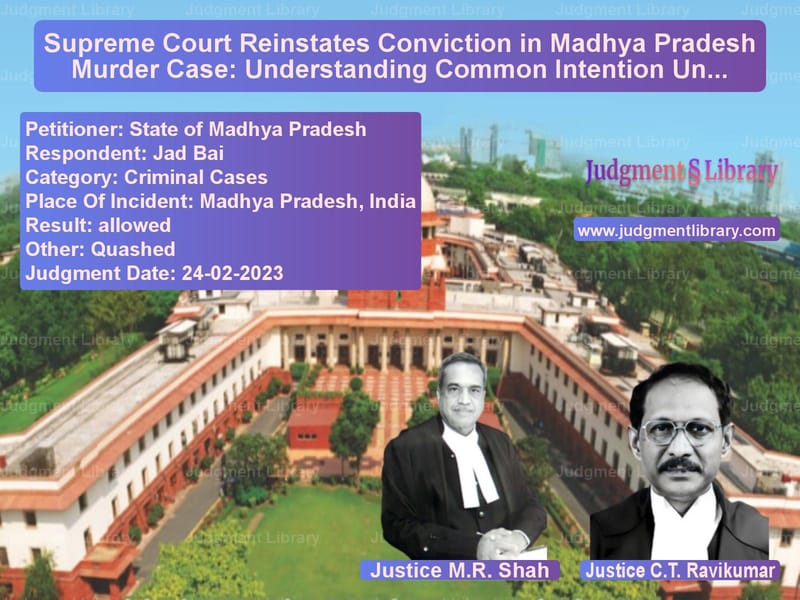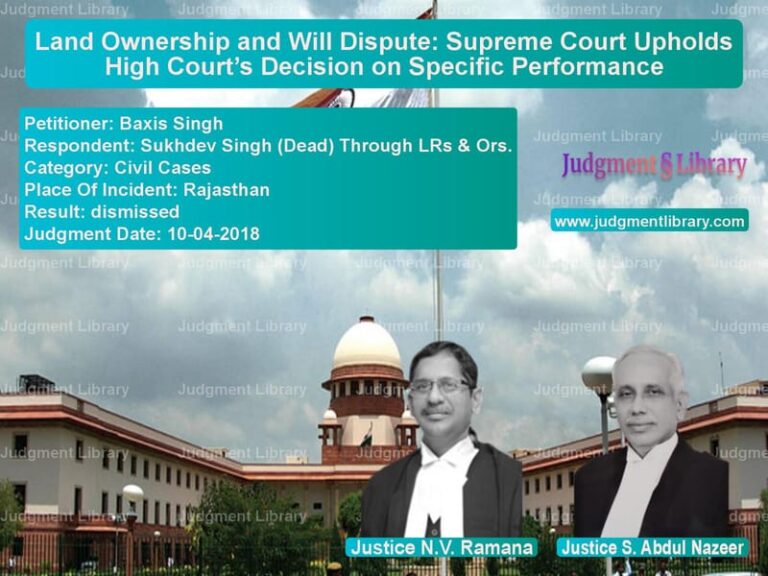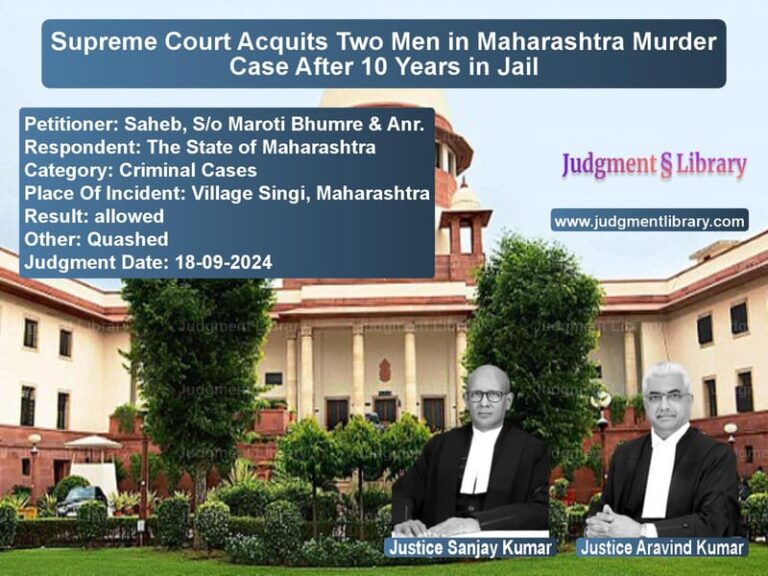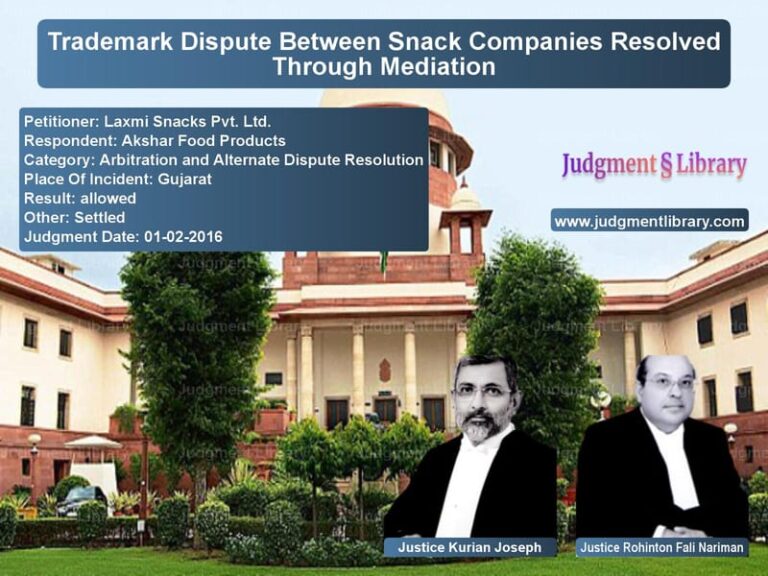Supreme Court Reinstates Conviction in Madhya Pradesh Murder Case: Understanding Common Intention Under IPC
The Supreme Court of India recently ruled in the case of State of Madhya Pradesh vs. Jad Bai, reinstating the conviction of the respondent for the murder of Vesta under Section 302 read with Section 34 of the Indian Penal Code (IPC). The Court overturned the Madhya Pradesh High Court’s acquittal, emphasizing the role of common intention in joint criminal liability. This judgment serves as a significant precedent for cases involving multiple accused acting in concert.
Background of the Case
The case revolves around a murder committed on Diwali night in the state of Madhya Pradesh. The deceased, Vesta, was allegedly lured to the house of the accused under the pretext of a feast and was subsequently attacked and killed. The prosecution argued that the crime was premeditated, and that the accused, including the respondent, acted with a shared intention to commit the murder.
Read also: https://judgmentlibrary.com/supreme-court-ruling-on-dowry-death-case-understanding-section-319-crpc/
The prosecution’s case was primarily based on the testimony of Nanbai (PW1), the wife of the deceased, who witnessed the murder. She stated that the respondent held the deceased while her husband and son delivered fatal blows with an axe. Based on this testimony and other circumstantial evidence, the trial court convicted all accused under Section 302 read with Section 34 IPC, sentencing them to life imprisonment.
However, on appeal, the High Court acquitted the respondent, ruling that the prosecution had failed to prove common intention beyond a reasonable doubt. The State of Madhya Pradesh subsequently challenged this acquittal in the Supreme Court.
Petitioners’ Arguments
- The State of Madhya Pradesh contended that the respondent played an active role in the crime by restraining the deceased, thereby facilitating the fatal assault.
- They argued that the respondent’s presence at the scene and active participation demonstrated her shared intention with the other accused.
- The prosecution emphasized that common intention under Section 34 IPC does not require prior conspiracy but can develop on the spot.
- They cited judicial precedents, including Gurcharan Singh vs. State of Rajasthan, to establish that common intention can be inferred from the accused’s conduct.
Respondents’ Arguments
- The respondent’s counsel argued that there was no direct evidence proving her involvement in the crime.
- They contended that mere presence at the scene does not constitute criminal liability unless there is evidence of active participation.
- The defense asserted that the High Court correctly ruled in favor of the respondent, as the prosecution failed to establish common intention beyond reasonable doubt.
- The respondent claimed that she had no knowledge of the crime and was falsely implicated due to a land dispute.
Key Observations by the Supreme Court
The Supreme Court carefully analyzed the evidence and made several significant observations:
- Common Intention Does Not Require Prior Planning: The Court reiterated that common intention under Section 34 IPC can be formed at the spur of the moment.
- Active Participation Establishes Liability: The Court noted that restraining the victim while the co-accused delivered fatal blows constitutes active participation in the crime.
- Failure to Explain Actions: The respondent did not provide any explanation for her actions in her Section 313 statement, which further indicated her culpability.
- Testimony of Eyewitness Was Credible: The Court upheld the testimony of Nanbai (PW1) as reliable and consistent, dismissing the defense’s claim that she was not an eyewitness.
Judgment
Based on the above findings, the Supreme Court ruled:
- The High Court’s acquittal of the respondent was overturned.
- The respondent’s conviction under Section 302 read with Section 34 IPC was reinstated.
- The respondent was ordered to surrender within six weeks to serve her remaining sentence.
Implications of the Judgment
This ruling clarifies critical aspects of criminal law:
- Broadening the Scope of Common Intention: The judgment reinforces that even passive roles in a murder can establish liability under Section 34 IPC.
- Strengthening Joint Criminal Liability: The ruling serves as a precedent for future cases involving multiple accused acting in concert.
- Preventing Acquittals Based on Technicalities: The decision ensures that accused individuals cannot escape liability merely by claiming a passive role.
- Encouraging Stronger Prosecution: The ruling emphasizes the importance of thorough investigation and credible eyewitness testimony in securing convictions.
Conclusion
The Supreme Court’s ruling in this case sets a significant precedent in criminal law, reinforcing the concept of common intention in joint liability cases. By reinstating the conviction, the Court ensured that all participants in a criminal act are held accountable, preventing individuals from escaping justice based on technicalities. This judgment serves as an important guideline for future cases involving collective criminal acts.
Petitioner Name: State of Madhya Pradesh.Respondent Name: Jad Bai.Judgment By: Justice M.R. Shah, Justice C.T. Ravikumar.Place Of Incident: Madhya Pradesh, India.Judgment Date: 24-02-2023.
Don’t miss out on the full details! Download the complete judgment in PDF format below and gain valuable insights instantly!
Download Judgment: state-of-madhya-prad-vs-jad-bai-supreme-court-of-india-judgment-dated-24-02-2023.pdf
Directly Download Judgment: Directly download this Judgment
See all petitions in Murder Cases
See all petitions in Bail and Anticipatory Bail
See all petitions in Custodial Deaths and Police Misconduct
See all petitions in Attempt to Murder Cases
See all petitions in Fraud and Forgery
See all petitions in Judgment by Mukeshkumar Rasikbhai Shah
See all petitions in Judgment by C.T. Ravikumar
See all petitions in allowed
See all petitions in Quashed
See all petitions in supreme court of India judgments February 2023
See all petitions in 2023 judgments
See all posts in Criminal Cases Category
See all allowed petitions in Criminal Cases Category
See all Dismissed petitions in Criminal Cases Category
See all partially allowed petitions in Criminal Cases Category







